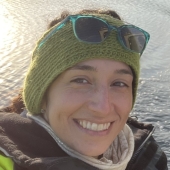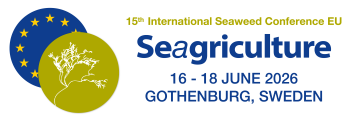About the speaker:
Luiza began working with seaweeds in 2011 in Portugal and Norway, in Seaweed Solutions AS, gaining experience in the whole seaweed value chain. Her focus is on environmental impacts and benefits from seaweed farms, and monitoring the production at sea. Since 2021, her PhD investigates the role of seaweed farms in carbon capture and sequestration. She enjoys promoting education and project collaboration in inventive seaweed topics.
Company info:

SINTEF is a non-profit organization and one of Europe's largest independent research institutes, with over 2000 employees. SINTEF Ocean conducts research and innovation relating to ocean space for national and international industries. It is home to the world's largest ocean basin laboratory, in addition to marine technology laboratories and the biomarine laboratories at SINTEF SeaLab. Their ambition is to continue Norway's leading position in marine technology and biomarine research. Through SINTEF Ocean they have established a centre of gravity for marine and maritime research, both in Norway and internationally, with a focus on sustainable use of the ocean. Transport, food and energy production represent the backbone of ocean-based industries, and are also core areas for SINTEF Ocean. They will continue to work together with partners and top-level experts on sustainable growth and value creation to fulfill company vision, "technology for a better society”.
Presentation:
Seaweeds at a seaweed farm are constantly growing and eroding, capturing carbon and releasing some of it to the surrounding environment. Small but continuous losses are inevitable during the grow-out phase at sea and are hard to measure. This unseen production has a value in passive carbon sequestration. Particulate and dissolved organic carbon may be converted by bacteria into long-lasting, recalcitrant carbon, able to accumulate and become sequestered in the water column, in sediments under farms or in the deep sea. The focus of the study is to provide new data for a flagship European cultivar, Saccharina latissima, on the production, breakdown and characterization of macroalgae-derived organic carbon.



